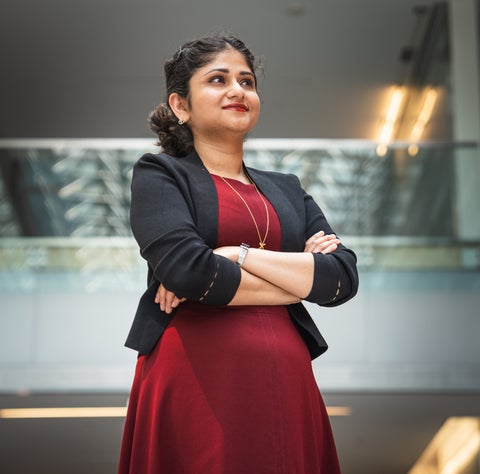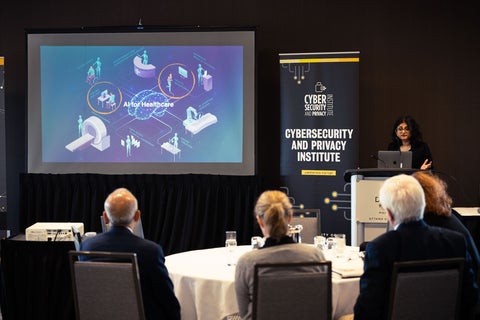
Roorkee is a small town in the north Indian state of Uttarakhand, approximately 170 km from the Indian capital of New Delhi. It is home to the College of Engineering (COER) Roorkee, which Sirisha Rambhatla attended for Electronics and Telecommunication Engineering. A brilliant student, she finished top three in her cohort across the university. During her undergraduate degree, she interned at IIT Roorkee and IIT Kanpur, two of the top engineering colleges in India. She designed embedded control systems for lunar rovers, like those used on Chandrayaan-1, India's first lunar probe mission. Those same control systems are still used to teach undergraduate engineering students. Her passion for signal processing eventually took her from the temperate climate in Roorkee to an icy tundra at the University of Minnesota under the supervision of Dr. Jarvis Haupt.

I finished my masters, and honestly, I wasn't thinking about a PhD," Sirisha recalls. "I worked as a science advisor in intellectual property litigation for a law firm in Minneapolis for a year and a half after I graduated, and I was enjoying it.
While working at the law firm, Sirisha's master's research was published. She presented her findings to her contemporaries, and the response to her work was overwhelming. So much so that Dr. Haupt asked her if she would like to return to pursue a PhD, and she did. During her doctorate research, Sirisha worked on theoretical underpinnings of various matrix and tensor demixing tasks, a mathematical technique used to analyze and separate mixed signals or data represented in a multi-dimensional structure called a tensor. Her work culminated in a matrix factorization algorithm that was orders of magnitude better than the state-of-the-art factorization algorithm at the time. The factorization problem falls into a class known as non-convex problems, which are at the heart of the optimization that powers deep learning.
Her quest to expand her research to real-world machine learning (ML) took Sirisha to the University of Southern California (USC), where she applied her expertise to build physics-informed machine learning models, explainability of deep learning models, and potential artificial surgery (AI) for surgery applications, including robot-assisted surgical skill assessment and burn surgical candidacy. Her time at USC coincided with the start of the pandemic. With the world ground to a halt, Sirisha was motivated to work on multiple COVID-19 based projects. She developed time and location-based risk scores to guide policy decisions, to track the evolution of the pandemic, and created one of the first works on COVID-19 misinformation spread on Twitterin March of 2020. Her leading-edge postdoctoral research at USC resulted in her being awarded the prestigious Merit Award for Excellence in Postdoctoral Research for Women in Science and Engineering in 2021.
"Doing a PhD is a big endeavor, and when you look back at the journey, you'll realize it was never a linear path, and there were times when you failed and failed miserably," commented Sirisha, reflecting on her journey. "You think that other folks (senior academics) know everything, and that's how we all start, but at some point, you realize it's your problem, and it's you with the torch on a path of discovery. Once that clicks, you become fearless and creative."
That path of discovery ultimately led to the University of Waterloo, where Sirisha is an assistant professor leading the Critical ML lab. Her research group focuses on intelligent automation, spatial-temporal data analysis, statistical machine learning, and artificial intelligence (AI) for surgery and healthcare. Her research collaborations range from Nissan's AI and Mobility lab in Japan, where her team developed a spatial-temporal transformer model for accurate ego-pose estimation, AI for aviation operations with Navblue Inc., and an intelligent manufacturing collaboration with Apple Inc. Sirisha's work also extends into the healthcare space with a partnership with the University Health Network (UHN), where applications of her machine learning models are helping map outcomes for patients waitlisted for liver transplants. She also works locally with Grand River Hospital (GRH), using AI/ML to identify bias in healthcare systems and build models to improve emergency department operations and maternal health outcomes.

Recently, Sirisha spoke in Ottawa at the "Cybersecurity, Privacy, and Artificial Intelligence in Health Data: Advancements and Challenges Conference" organized by the Cybersecurity and Privacy Institute in collaboration with Health Canada, StatsCan, and the Canadian Institute for Health Information. Sirisha's presented her research titled "Making Canadian Healthcare Systems AI Ready: What do we need to build AI-powered Trustworthy Primary Healthcare Solutions?" She observes that a roadblock to progress in implementing AI/ML tools is patient information and data; both are fragmented and siloed; thus, there's a need for consolidated healthcare records that are accessible and secure. Sirisha notes that data collection procedures differ amongst hospitals. "Data that comes to us has already gone through ethics reviews, and most of the time, we're working with anonymized data, but some of these models need demographic information to train fair ML models, which means that we also need to make them secure and privacy-preserving."
Data systems need to be interoperable, but updating these systems is costly. Learning models which work across health systems is possible. Still, the data privacy of patient records used to train those models must be carefully considered. To mitigate these security and privacy risks, Sirisha is working towards using synthetic health data as an alternative. How close is synthetic data to actual patient data? Are there reliability issues surrounding models trained on synthetic health data? Security and privacy advantages aside, Sirisha is honest when she says more work is needed to evaluate these and other questions around synthetic health data in AI/ML models.
Sirisha's fast-growing research group at the Critical ML lab consists of five graduate students. She has worked with over a dozen undergraduate researchers, amongst other external collaborators, to develop real-world AI/ML models for critical applications. Sirisha's final piece of advice to other women in science and engineering is, "It doesn't get easy, be fearless about what you're pursuing; there's rarely ever a shortcut, it's never too early or late to ask for advice, and just go for it because if you don't take that shot, there's no chance to win."
More information about her research and Critical ML can be found at sirisharambhatla.com